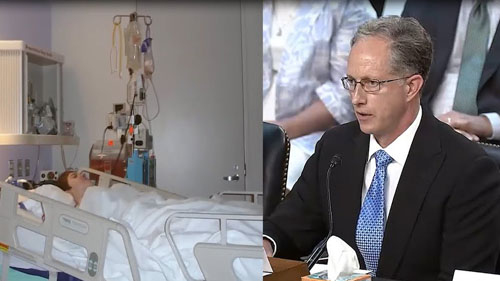| Recent Featured Videos and Articles | Eastern “Orthodoxy” Refuted | How To Avoid Sin | The Antichrist Identified! | What Fake Christians Get Wrong About Ephesians | Why So Many Can't Believe | “Magicians” Prove A Spiritual World Exists | Amazing Evidence For God | News Links |
| Vatican II “Catholic” Church Exposed | Steps To Convert | Outside The Church There Is No Salvation | E-Exchanges | The Holy Rosary | Padre Pio | Traditional Catholic Issues And Groups | Help Save Souls: Donate |  |









 " />
" /> " />
" /> " />
" /> " />
" /> " />
" />




St. Ambrose and "Baptism of Desire"
Out of the hundreds of fathers of the Church, the only other one that the baptism of desire advocates even try to quote is St. Ambrose. They think that in his funeral speech for his friend (the Emperor Valentinian) he taught that the emperor (who was only a catechumen) was saved by his desire for baptism. But St. Ambrose’s funeral speech for Valentinian is extremely ambiguous and could be interpreted in a variety of ways. It is thus gratuitous for them to assert that it clearly teaches the idea of “baptism of desire.”
Let us reflect for a moment on what he just said. All of the faithful assembled for the memorial service are grieving and mourning. Why are they grieving? They are grieving because there is no evidence that Valentinian, a known catechumen, had been baptized. But if “baptism of desire” were something contained in the Deposit of Faith and part of apostolic Tradition, why should they grieve? Did not Valentinian earnestly desire baptism? Yet, these faithful were grief stricken because they had all been taught, and therefore believed, that “unless a man is born again of water and the Holy Ghost, he cannot enter into the Kingdom of God” (John 3:5). They had all been taught that no one is saved without the Sacrament of Baptism. Their teacher was their bishop, St. Ambrose.[2]
Furthermore, St. Ambrose’s funeral speech for Valentinian is extremely ambiguous, as is obvious to anyone who reads the above. In the speech, St. Ambrose clearly says that “martyrs are not crowned [that is, not saved] if they are catechumens,” a statement which directly denies the idea of baptism of blood and is perfectly consistent with his other statements on the issue, which will be quoted. Ambrose then emphasizes the same point, by stating again that catechumens “are not crowned if they are not initiated.” “Initiation” is a term for baptism. Thus, St. Ambrose is repeating the apostolic truth that catechumens who shed their blood for Christ cannot be saved if they are not baptized. He then proceeds to say that if they are washed in their own blood, his (Valentinian’s) piety and desire have washed him also, which seems to directly contradict what he just said and seems to teach baptism of desire and blood, although it is not clear, since he did not say that Valentinian was saved without baptism. But if that is what St. Ambrose means, then his funeral speech is nonsensical, since he just clearly denied two times that martyrs can be crowned if they are catechumens. And this is the oldest “text” quoted in favor of the idea of baptism of desire! It is, first of all, contradictory; secondly, it is ambiguous; and thirdly, if interpreted to mean that a catechumen is saved without water baptism, is opposed to every other statement St. Ambrose formally made on the issue.
But perhaps there is another explanation. St. Ambrose states that the faithful were grieving because Valentinian did not receive the sacraments of baptism. Why did he use the term “sacraments” instead of “sacrament”? Was he lamenting the fact that Valentinian was not able to receive Confirmation and the Eucharist, which were commonly administered together with Baptism in the early Church? This would correspond to his statement about the crowd being disturbed because the mysteries were not “solemnly” celebrated, in other words, with all of the formal ceremonies which precede the solemn celebration of Baptism. Exactly what St. Ambrose meant in this speech, we may never know in this world, but we are permitted to assume that it was not his intention to contradict in an emotionally charged eulogy what he had written with much thought and precision in De Mysteriis and elsewhere.[3]
Interestingly, the famous 12th century theologian Peter Abelard, whose orthodoxy was nevertheless suspect on other points, points out that if St. Ambrose taught baptism of desire at any time he “contradicts tradition in this matter,”[4] not to mention Ambrose’s own repeated teaching on the necessity of the Sacrament of Baptism, as we will see below.
And here is what St. Ambrose wrote with much thought and precision, which eliminates the very concept of baptism of desire and affirms the universal Tradition of all the fathers that no one (including catechumens) is saved without water baptism.
Here we see St. Ambrose clearly denying the concept of baptism of desire. Nothing could be more clear!
As opposed to St. Cyril of Jerusalem and St. Fulgence, who at one time mentioned their belief that there were exceptions to John 3:5 in the case of martyrs only, St. Ambrose acknowledges no exceptions, thereby excluding baptism of desire and baptism of blood.
And with that we come to the extent of the fathers’ teaching on the so-called “baptism of desire”! That’s right, one or at the most two fathers out of hundreds, St. Augustine and St. Ambrose, can even be quoted. St. Augustine admitted that he struggled with this issue, contradicted himself on it, and most importantly, frequently affirmed the universal Tradition that no one – including a catechumen – enters heaven without water baptism. And St. Ambrose clearly and repeatedly denied the concept of baptism of desire numerous times, by denying that any person – including a catechumen – could be saved without rebirth of water and the Spirit in the Sacrament of Baptism.
And when these facts are known, one can see how deceived and misled are many so-called Catholics and Traditional Catholics today who are listening to those lying teachers, many of whom claim to be “traditional” priests, who search land and sea to attempt to pervert the teaching of Tradition and get people into Heaven without baptism. These lying teachers are convincing many of the ridiculous lie that “the fathers were unanimous in favor of baptism of desire.” Such a claim is pure nonsense and a mortally sinful perversion of Catholic Tradition. As one author correctly put it:
The universal Tradition of the apostles on the absolute necessity of water baptism for regeneration and salvation, affirmed by Hermas as early as the 1st century, and repeated by all the rest, including St. Justin Martyr, St. Theophilus, Origen, Tertullian, St. Basil, St. Cyril, St. Augustine, St. Ambrose, etc., etc., etc. is summed up by the statement quoted already from Ambrose.
This is the unanimous teaching of the fathers of the Church on this issue.
[1] Quoted by Fr. Jean-Marc Rulleau, Baptism of Desire, pp. 30-31; also by Fr. Francois Laisney, Is Feeneyism Catholic?, p. 61.
[2] Bro. Robert Mary, Fr. Feeney and the Truth About Salvation, p. 132.
[3] Bro. Robert Mary, Fr. Feeney and the Truth About Salvation, p. 133.
[4] Fr. Jean-Marc Rulleau, Baptism of Desire, p. 37.
[5] Jurgens, The Faith of the Early Fathers, Vol. 2: 1330.
[6] Jurgens, The Faith of the Early Fathers, Vol. 2: 1323.
[7] Jurgens, The Faith of the Early Fathers, Vol. 2: 1324.
[8] Michael Malone, The Only-Begotten, p. 404.
[9] Jurgens, The Faith of the Early Fathers, Vol. 2: 1330.
[10] Jurgens, The Faith of the Early Fathers, Vol. 3, pp. 14-15 footnote 31.
Sign up for our free e-mail list to see future vaticancatholic.com videos and articles.
Recent Content
^